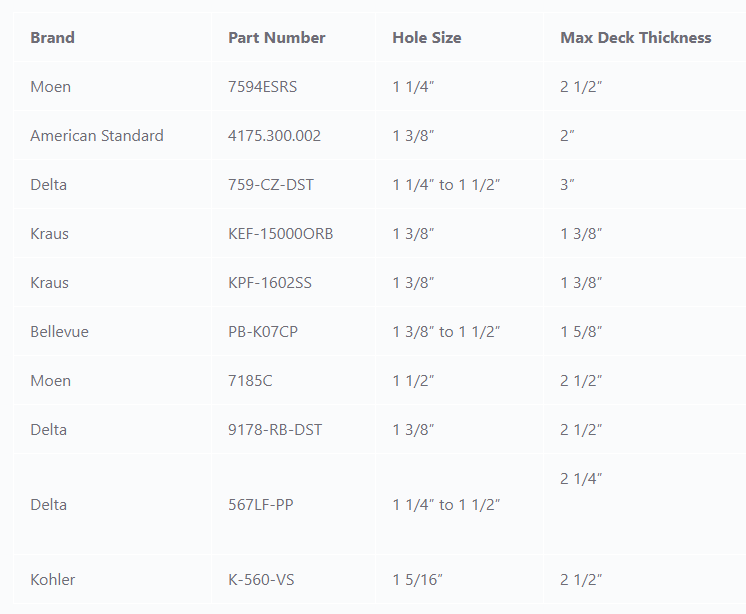When you plan to replace or install a kitchen or bathroom faucet, it is essential to know some information about sink faucets, such as standard hole size and spacing. This post aims to tell you what the standard size hole for a kitchen or bathroom faucet is and other imformation about faucet hole size.
As a general rule, the standard faucet hole sizes for kitchens and bathrooms are 1 3/8″ in diameter (1.375 Inches or 34.925 mm) . But the size of faucet hole may vary for different brands and models. Here’s the details of hole size of kitchen and bathroom faucet.
You are watching: What is The Standard Size Hole for A Kitchen or Bathroom Faucet
Comparison of some faucet hole sizes
Although the hole sizes for kitchen and bathroom are standard, they may be various from different brands and models. To illustrate it, I list the hole sizes of some faucets of different brands and models.
As you can see above, the standard faucet hole is often 1 3/8 inch, which varies slightly between different models and brands. The maximum deck thickness also plays an important role. If the deck is too thick, the faucet may not fit the basin. Also, the workaround may damage the tap hole area of the washbasin. Therefore, it is important to find the maximum deck thickness of a particular faucet. Therefore, it is best to find out before buying a faucet.
How to measure the faucet hole size
The best way to measure the inner diameter of the tap hole is to use a sliding caliper. The measurement accuracy of this type of tool ranges from +/- 0.001″ to +/- 0.0015″ (+/- 0.02 mm to +/- 0.04 mm). Therefore, you can get a accurate result by using this tool to measure tap hole.
Detailed steps to messure the faucet hole size:
- Place the inner jaw of the caliper against the inside of the tap hole.
- Slide the scale outwards until the maximum distance is reached.
- Slide the caliper out, and the displayed reading will be the diameter of the tap hole.
Standard faucet hole spacing
The faucet hole spacing depends on the installation configuration of a specific faucet. In addition, the standard faucet drilling is single hole, centerset, minispread or widespread. Also, two other less common types are vessel and wall-mounted.
Single-Hole
Read more : Leaders Say Chelsea and Hell’s Kitchen Need Attention Now
The single-hole faucet requires only one hole and is the most common configuration. Yet, if the basin is already drilled with extra holes, escutcheon plates can cover them up.
Centerset
In the centerset faucet, the handle is four inches from the outlet. Therefore, they are three holes, combining the nozzle and two handles into one base. Sometimes, both handles of the faucet are mounted on a single plate six inches apart.
Minispread
The minispread faucet and centerset faucet are more or less the same. The difference being, the spout and handles are not connected by a single plate.
Widespread
The widespread sink hole configuration is suitable for faucets with three holes. In addition, the nozzle and handle are six to sixteen inches apart.
Vessel
The vessel configuration is suitable for high faucet. Moreover, sinks are usually higher than other types. In addition, the hole was not drilled into the sink. Usually, they come with a single handle.
Wall-Mounted
The wall-mounted faucet does not sit on the sink like similar products, but is installed on the wall. Usually, they have long spouts to extend the contact range. Moreover, they must have sufficient basin clearance.
Related question of faucet standard size hole
1. The faucet I bought recently, my faucet hole is too small. what do I do?
You have two options. First, replace the recently purchased faucet with a faucet that matches the configuration. Or, increase the hole size to accommodate purchased faucets. You can use an electric drill yourself, or you can hire a professional in your area.
Read more : What happened to Charlie’s Italian Bistro after Gordon Ramsay’s Kitchen Nightmares: Open or Closed?
2. How to cover the extra sink hole?
You can cover the extra sink hole with a decorative frame plate. If the holes are too far apart, they can be covered with a single hole cover. Most faucets are equipped with additional covers in case of emergency.
3. What is the ideal thickness of the faucet hole?
The thickness of the tap hole varies from device to device. Therefore, it is wise to refer to the specification to determine the maximum deck thickness.
4. How many holes are needed for faucet installation?
The number of holes required for faucet installation depends on the type of fixture. Generally speaking, they tend to be between single-hole to four-hole fixtures. Among them, the soap dispenser occupies the fourth hole.
5. Can I drill the tap hole by myself?
Yes, you can. Choose a suitable drill bit for drilling and use an electric drill with a guide to drill the hole. First, make sure to mark exactly where you need to drill. Do not drill holes in the actual sink before practicing several times on a plate or similar material. Once you feel it, you can drill into your sink. Be steady when holding the drill. When drilling, gradually apply pressure to allow the drill to complete the work. Watch this video.
Most Popular Faucets Recommended
Source: https://gardencourte.com
Categories: Kitchens

